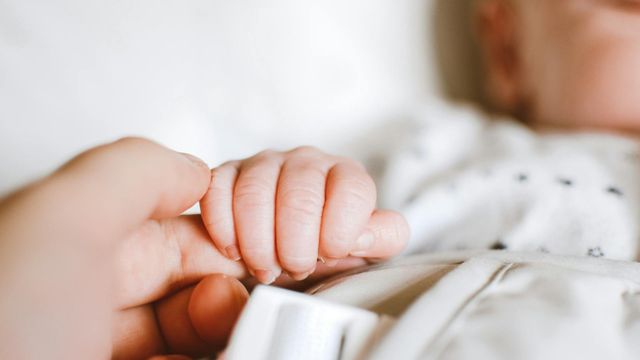12 Weeks Pregnant: Baby Development, Symptoms & Signs

This is a big week for your baby: Your little one’s key body systems and vital organs have formed, including those that will help fight off germs and make eating food possible.
Meanwhile, at 12 weeks pregnant and with the second trimester in sight, your baby bump may be looking a little more pronounced. If not? Don’t worry. It will soon enough!
Your Baby at Week 12
At a Glance
The big move
During week 8, your baby’s intestines were infringing on umbilical cord space. But this week, they’re completing the move back into the abdomen.
Future grandparent?
Your baby’s pituitary gland at the base of the brain has begun producing hormones, meaning your little one could give you grandchildren one day.
Germ fighter
Your baby’s bone marrow is making white blood cells, so she’ll be able to fight off all those germs passed around the playground.
12 weeks pregnant is how many months?
If you’re 12 weeks pregnant, you’re in month 3 of your pregnancy. Only 6 months left to go! Still have questions? Here’s some more information on how weeks, months and trimesters are broken down in pregnancy.
How big is my baby at 12 weeks?
By now your baby weighs a full half-ounce, with a crown-to-rump length of 2 to 2¼ inches: about the size of a lime.
It may be hard to believe if you’re not really showing yet (though plenty of women do look pregnant at this point), but your baby has more than doubled in size during the past three weeks.
Baby’s digestive system begins working
This week marks a turning point for your baby. At 12 weeks pregnant, the Herculean task of developing new bodily structures is nearing an end, as most of your baby’s systems are fully formed — though there’s still plenty of maturing to do.
Now comes the maintenance phase, during which your fetus’ systems continue to evolve for the next 28 weeks and the organs get to work. For one thing, the fetal digestive system is beginning to flex its muscles — literally — as it starts practicing contraction movements, a skill your little peanut will need after birth to push food through the digestive tract.
Baby’s in germ-fighting mode
The bone marrow is busy making white blood cells — weapons that will one day help your baby fight infections once she’s out of your safe haven and in a regular play group. And the pituitary gland at the base of the brain has started producing the hormones that’ll enable her to make babies of her own in a few decades or so.
Your Body at Week 12

The end of some pregnancy symptoms
As you near the end of your first trimester, your uterus, now about the size of a large grapefruit, begins to migrate from the bottom of your pelvis to a front-and-center position in your abdomen.
If you’re lucky, this will bring an end to one pesky early pregnancy symptom: the constant urge to urinate.
Also slated to diminish somewhat now that you’re on the cusp of your second trimester are some of those other early pregnancy symptoms: nausea, super tender breasts and nipples, food aversions and fatigue.
Your 12 weeks pregnant belly
At 12 weeks, your baby bump may be more pronounced and show to the outside world. But it’s just as likely that while your clothes may be getting a little tight, you won’t yet have a noticeably pregnant belly at this point.
Whatever the case may be, know that your 12 weeks pregnant belly is completely normal, whether it’s on the bigger, smaller or invisible side. Baby bumps can vary widely depending on the woman’s size and shape and whether this is a first or subsequent pregnancy.
So don’t fret if your bump at 12 weeks doesn’t look like your pregnant friend’s at the same stage. All bumps are beautiful! If you’re not showing yet, you will be in time, and if you are showing quite a bit, that’s fine too. You can always talk to your practitioner if you have any concerns.
Dizzy spells
Once you hit your second trimester, there’s a new pregnancy symptom that may be added to the mix: dizziness. And guess who’s to blame? Yup — it’s your old friend progesterone again, which causes your blood vessels to relax and widen around 12 weeks pregnant, increasing the flow of blood to your baby (again, good for baby), but slowing the return of blood to you (as always, not so good for mom).
What that means for you is lower blood pressure and reduced blood flow throughout your body, including to your brain. These factors can contribute to that light-headed, dizzy feeling — especially when you get up too quickly — which is why slow and steady wins the race here.
Another cause of dizziness during pregnancy is low blood sugar levels, which can occur if you’re not eating regularly. So don’t try to run…or even walk…on empty.
Here’s a quick tip: If you feel dizzy or faint, lie down or sit with your head lowered between your knees, take deep breaths and loosen any tight clothing — like that button on your jeans you struggled to close in the first place. As soon as you feel a little better, get something to eat and drink.
Low sex drive
Your best friend says being pregnant has seriously boosted that good old libido — but you aren’t feeling any friskier. What’s the deal with your decreased sex drive?
Hormones hit every woman differently, meaning a spike in sex drive for some and a damper on it for others. Pregnancy symptoms can also stand between you and a good time — after all, it’s hard to get in the mood when you’re queasy, tired or constipated (or all of the above and then some!).
Rest assured, whatever you’re feeling is normal. Just stay emotionally connected with your partner and remember that many women have ups and downs in sex drive throughout pregnancy. So you may be in for a warmer spell soon.
Pregnancy Symptoms Week 12






Tips for You This Week
Know your workout no-no’s
Here’s a quick list of some things to avoid during your pregnancy workouts:
-
Don’t exercise on your back after the first trimester.
-
Try not to hold your breath while you work out.
-
Steer clear of jerky or twisting motions, which could further strain your already stressed-out joints.
-
Be careful about moves that challenge your sense of balance or risk any sort of trauma to your abdomen.
You’ll soon have less oxygen available for exercise, so stop when you get tired and avoid getting overheated. Now isn’t the time to do bikram or “hot” yoga.
Photograph your bump
Is your pregnant belly ready for its close-up? Someday you’ll enjoy looking at pictures or videos of your baby bump — and so will your child.
Once a month, document your changing figure. Start now (if you haven’t already) and take photos regularly until you deliver. Later, you can put your “bumpies” into some kind of pregnancy album — you’ll be glad you did.
Snack before exercise
One of exercise’s big benefits is that it burns calories. Card-carrying baby-builders like you, though, get the pleasure of replacing those calories with some healthy pregnancy snacks.
So 30 minutes before you exercise, hit the fridge for a light snack and a drink. Follow up your workout with an encore snack.
Bananas and orange juice are great options because they contain plenty of potassium, an essential nutrient that’s lost when you perspire, plus they supply quick energy. Add a little protein for staying power like a hard-boiled egg or a cheese stick.
Start budgeting for baby
Having a baby was never cheap — but thanks to inflation, a middle-income family may now spend an average of $18,270 on a child each year.
Here’s a range of what you may spend on baby on some of the bigger ticket items:
-
Car seat: $80 to $400
-
Stroller: $100 to $1,000
-
Bassinet: $70 to $650
-
Crib: $125 to $350 or more
-
Baby monitor: $25 to $400
-
Diapers for the first year: $510 to $930
-
Formula for a year: $1200 to $1500
Don’t stress about buying everything all at once. Some (or all) of them can go onto your baby registry, if you have one.
And for anything that doesn’t make the cut, just try to save a little at a time — say, by cutting back on restaurant meals or canceling some monthly subscriptions you no longer use regularly.
Go for loose styles to manage tummy upset
Nearly half of pregnant women will have heartburn, bloating and other tummy troubles — and for some, it may last all nine months.
You can put out the fire by wearing looser or stretchy clothes, like empire-waist maxi dresses, drawstring pants and lightweight sweaters. Anything that’s too tight around your waist can constrict your tummy, fueling the burn.
Stay hydrated
Drink up — it’s more important than ever to stay hydrated, so plan on adding an extra glass of liquid for every half hour of activity. And no cheating … it should be an 8-ounce glass.
Stick to water when possible — sports drinks contain too many ingredients you just don’t need. Take in even more fluids in warm weather or when you’re just plain sweating a lot.
Don’t skip all seafood
For the pregnant set, not all fish are created equal. While you should avoid high-mercury fish like tilefish from the Gulf of Mexico, shark, swordfish, orange roughy, bigeye tuna, marlin and king mackerel, don’t steer clear of all good-for-you seafood.
Fish is one of the best sources of DHA (a healthy omega-3 fatty acid), so try to eat two to three servings of well-cooked shellfish, canned light tuna, salmon (wild-caught is best), or cod a week.
Recommended Products
What to Expect selects products based on real-life testing conducted by staff, contributors and members our user community, as well as independent research and expert feedback; learn more about our review process. Prices and details are accurate as of the published date. We may earn commissions from shopping links.
link





:max_bytes(150000):strip_icc()/asian-sick-little-girl-lying-in-bed-with-a-high-fever-952683074-5b5b784046e0fb005027ca13.jpg)

